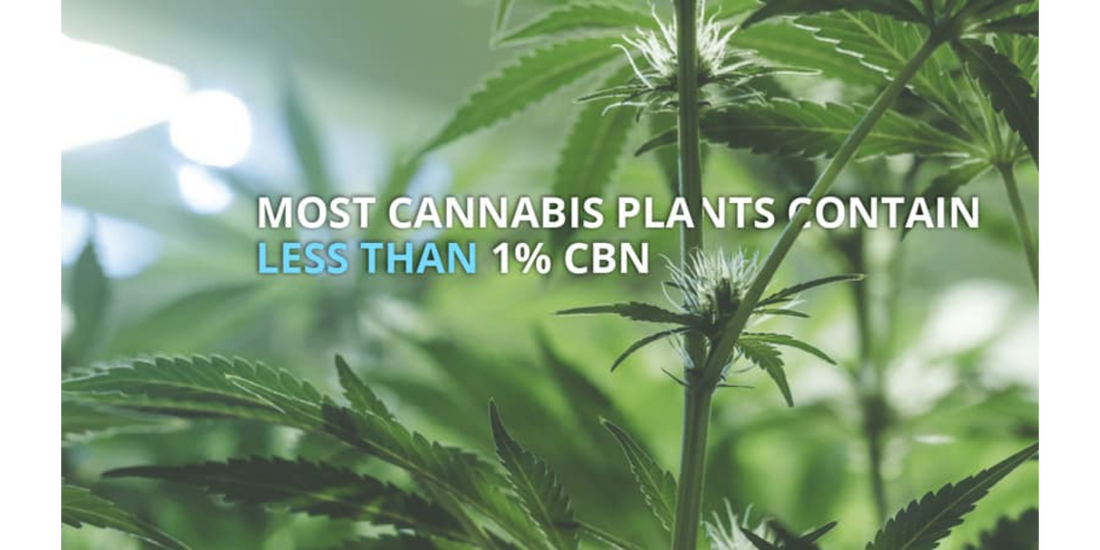What is CBN?
Cannabinol, or CBN, is a non-psychoactive cannabinoid found in low concentrations in cannabis plants. It is a metabolite of THC, which means that Δ9THC degrades into CBN over time. Just like a fine wine or bourbon, the cannabis plant undergoes a series of changes, especially if exposed to sunlight and air. Coincidentally, cannabinol is technically classified as an alcohol.
Cannabinol (CBC) generally occurs in relatively low concentrations, even in aged cannabis. But manufacturers have worked out a method of isolating the compound to create products with higher ratios of CBN. Final products are typically formulated with other cannabinoids, namely CBD, and various synergistic terpenes in tincture or vape form. While CBN is sometimes included in CBD products, it is usually found in trace amounts.
There are quite a few misconceptions about this minor cannabinoid that will be cleared up in this guide. In fact, when you google “CBN oil”, it will likely ask you if you meant CBD oil instead. The research is somewhat limited compared to the major cannabinoids, but recent studies have been revealing that it may have its own therapeutic potential. CBN is steadily becoming one of the more sought-after minor cannabinoids.
Benefits of CBN:
The current research on CBN shows some potential for a range of uses, despite it having a weak impact on the central immune system. Studies are scarce, but there are clinical trials currently being conducted on its potential for pain relief compared to opiates and placebo. Here are some of its more well-established benefits based on the current research.
Antibacterial
A 2008 study tested cannabinol along with four other cannabinoids for antibacterial properties. Researchers report “potent activity against a variety of MRSA strains of current clinical relevance”. They also found that cannabinol fought bacteria in an indirect way, but the study revealed the antibacterial potential for CBN along with other cannabinoids including CBD, CBC, CBG and THC.
Appetite stimulation
One of the more well-known effects of cannabis is referred to as “the munchies”. This is normally attributed to its THC content. However, a 2012 study shows potential for CBN to stimulate appetite, without the psychoactive consequences. According to the study, “This is the first time cannabinol (CBN) has been shown to increase feeding. Therefore, cannabinol could, in the future, provide an alternative to the currently used and psychotropic ∆9THC-based medicines since cannabinol is currently considered to be non-psychotropic.”
Anti-inflammatory
Another potential benefit of cannabinol is its application for fighting inflammation. A 1974 study conducted on lab rats “demonstrated the anti‐inflammatory actions of a crude extract of THC and of the non-psychoactive Cannabis constituents cannabidiol (CBD) and cannabinol. Further research needs to be conducted to determine the individual effectiveness of each cannabinoid.
Glaucoma
It has been said that cannabis can help for glaucoma. Is it true? When Israeli scientists set out to explore this claim in 2007, they found that CBN had a positive effect on OHT, or ocular hypertension. OHT is the most important risk factor for glaucoma. “THC, CBN, and nabilone were active in lowering intraocular pressure (IOP) in rabbits, while CBD was inactive”.
Neuroprotectant
A study on the effects of cannabinol on amyotrophic lateral sclerosis in mice was conducted in 2005. Scientists said “CBN was delivered via subcutaneously implanted osmotic mini-pumps (5 mg/kg/day) over a period of up to 12 weeks. We found that this treatment significantly delays disease onset by more than two weeks…”. More research is needed, but cannabinol could be a possible option for what is considered “the most common adult-onset motor neuron disorder”.
Will CBN get me high?
No, CBN cannabinol will not get you high, but there is a small caveat. Although it is considered psychologically inactive, it can actually intensify the euphoric effects of THC. Oils that contain strictly cannabinol won’t get you high unless they are formulated with tetrahydrocannabinol, aka THC.


